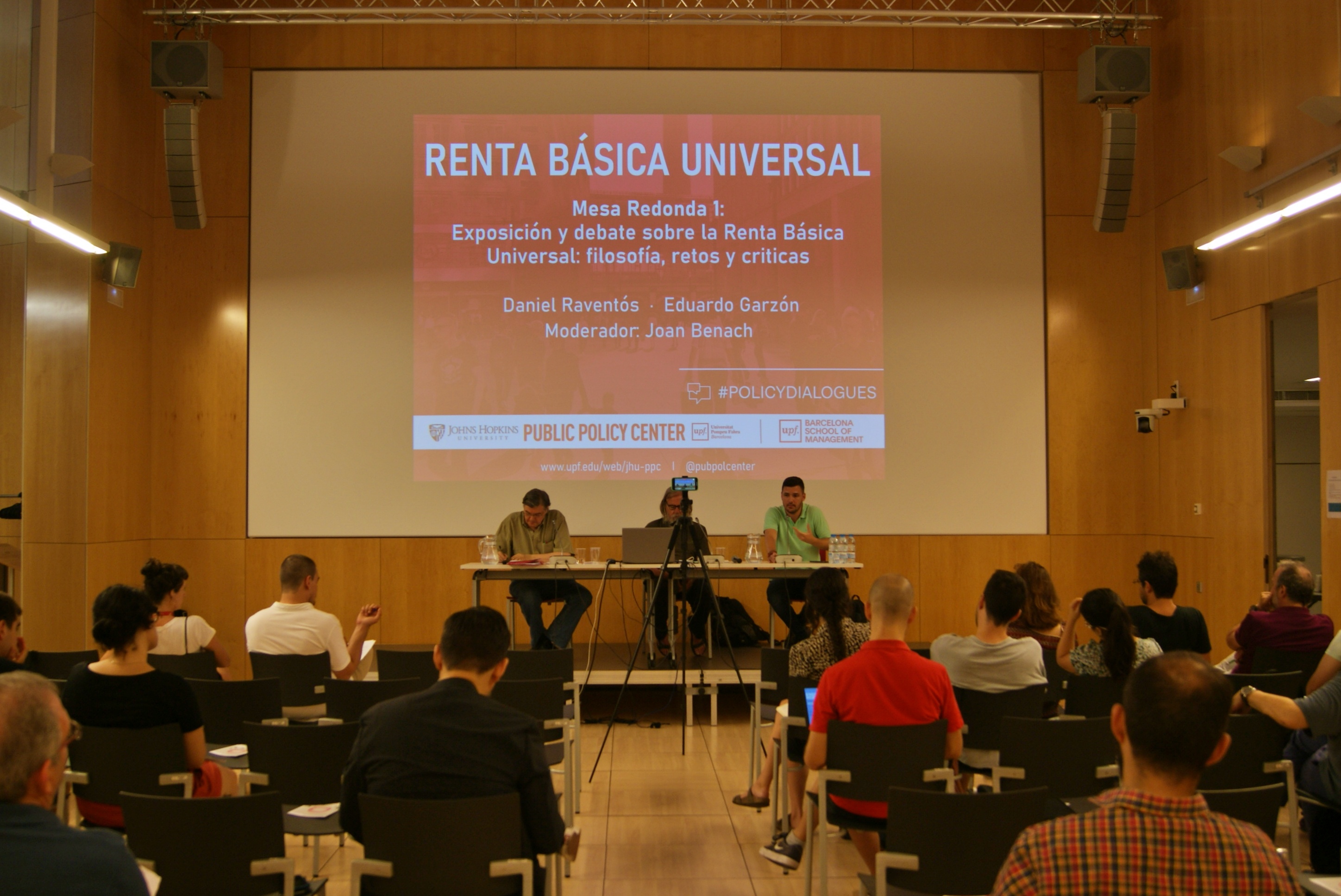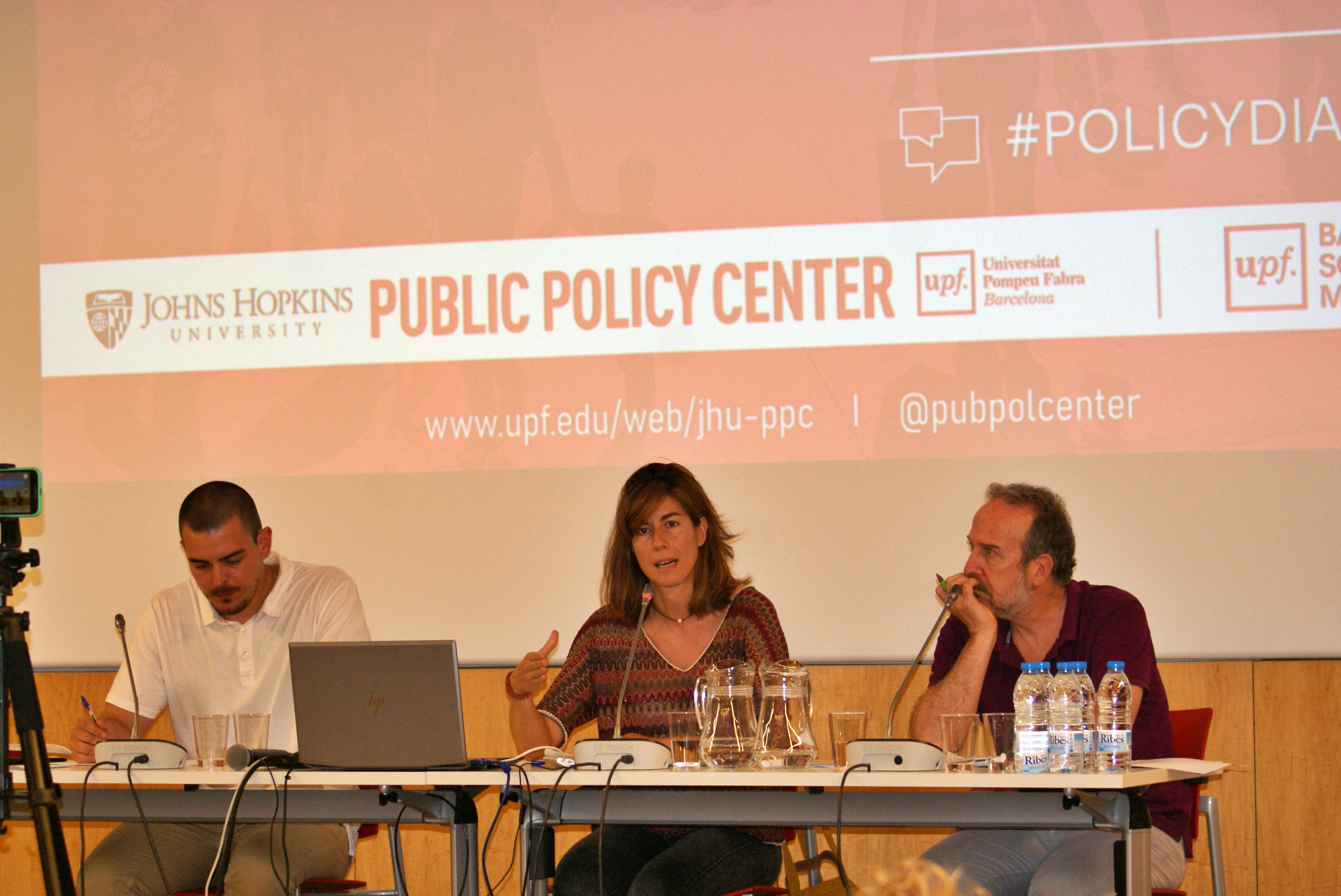"One of the virtues of Universal Basic Income is that it increases the freedom of the vast majority of the population." Report of the tenth Policy Dialogue session
"One of the virtues of Universal Basic Income is that it increases the freedom of the vast majority of the population." Report of the tenth Policy Dialogue session
An insightful debate on the political, economic and social dimensions of Universal Basic Income (UBI) took place in the June 2023 edition of Policy Dialogues entitled: "Universal Basic Income and the importance of evaluating public policies". The speakers Daniel Raventós, Eduardo Garzón, Mireia Borrell and Sergi Raventós – experts in labor, social and economic policies – examined, debated, and contemplated the wide-ranging economic, social, and psychological effects of UBI.

Universal Basic Income (UBI) is a bold proposal regarding income redistribution. It involves providing a consistent financial income to every individual living within a specific geographical region, without any restrictions or conditions, provided by the government. The core aim of UBI is to ensure a baseline income for all members of society, thereby fostering fairness and reducing poverty. It is characterized by five key features: the payment must be public, sufficient, individual (rather than allocated to families or housing units), unconditional and universal.
The idea of UBI has gained momentum in recent years, but its roots trace back centuries. It has a rich historical background and has been extensively explored through academic research, with the active involvement of organizations like the Basic Income Earth Network (BIEN). In the year 2021, the Office of the Pilot Plan for the Implementation of the Universal Basic Income was established in the Catalonian government (Generalitat de Catalunya), with the primary mission of formulating, executing and evaluating the UBI Pilot Plan within Catalonia. The implementation of the Pilot Plan is currently on hold due to the lack of parliamentary support, however the outcomes achieved by its implementation will potentially have a significant impact on the attitudes toward and adoption of similar policies in diverse regions of Spain and, indeed, on a global scale.
Consequently, the primary aim of this Policy Dialogue was to undertake a comprehensive examination of the attributes inherent to UBI and the issues associated with its practical implementation. The event was divided into two distinct sessions. Part 1, entitled: “Presentation and debate on Universal Basic Income: philosophy, challenges and critiques”, explored the core elements of UBI. This session was moderated by Joan Benach, co-director of the JHU-UPF Public Policy Center, and featured presentations by Daniel Raventós, President of the Basic Income Network, and Eduardo Garzón, professor at the Universidad Autónoma of Madrid. The second session of this Policy Dialogue, entitled: “The Pilot Plan in Catalonia and the importance of public policy evaluation", was moderated by Ferran Muntané, researcher of the JHU-UPF Public Policy Center, and featured contributions by panelists Sergi Raventós, Director of the Universal Basic Income Pilot Plan Office, and Mireia Borrell, Chief Analyst at Ivàlua (Catalan Institute for the Evaluation of Public Policies). This part of the event centered on the particulars surrounding the execution of the Pilot Plan within the Catalonia region.
Presentation and debate on Universal Basic Income: philosophy, challenges and critiques
Joan Benach opened the first session with a deep reflection: “Today we live in a society with global existential problems: the ecological crisis, war, geopolitical problems, problems related to neo-fascism, or the issue of authoritarianism, among others. All this means that we have to think about possible political solutions also from a systemic point of view. We know that it is not easy to implement systemic policies, to make several policies at the same time, but I think it is also necessary to think about it, to reflect on what we want to do. Therefore, we invite the speakers to reflect on the possible advantages, disadvantages and challenges posed by the Universal Basic Income.”
In the initial segment of the presentation, Daniel Raventós explained the dual principal contributions attributed to the Universal Basic Income (UBI). First and foremost, Raventós suggested that the UBI possesses the potential to amplify the bargaining power of workers and, to some extent, alleviate the commodification inherent in the labor market. He stated, "a Universal Basic Income could empower workers in demanding improved working conditions, as it secures their material sustenance independently of their engagement in the labor market."
Secondly, Raventós clarified that, in contrast to other policies such as conditional grants, which entail conditionalities and, as a result, create issues related to societal stigmatization and technical intricacies like administrative expenses, the principal objective of UBI is to guarantee the material sustenance of the entire population, regardless of wealth or income. He argued that it is therefore a more effective and desirable policy.
On the contrary, Eduardo Garzón emphasized certain issues inherent in the existing structure of UBI and offered insights into potential enhancements. Firstly, he explained that the provision of monetary resources poses a challenge, or at the very least, a risk. This arises from the fact that, within a market-driven capitalist economy, the mere provision of a monetary allowance to an individual does not ensure the attainment of essential necessities such as adequate food, housing, and transportation. This limitation persists because prices in such an economy are subject to the control of markets and entrepreneurs, which means that prices could rise in response to the provision of UBI, rendering it unable to fulfill its objective of covering basic needs. In Garzón's perspective, a potential solution would involve the provision of a UBI in-kind, directly guaranteeing essential necessities and therefore avoiding being affected by the market and economic fluctuations. This approach could mirror the existing models in sectors such as health and education, where services are provided directly rather than relying on monetary transactions within the market.
Furthermore, Garzón expressed, "It may be prudent to consider a Universal Basic Income with the assumption of responsibilities and commitments relating to the care of both our fellow human beings and our natural environment, thereby fostering principles of democratic, collective, social, and ecological responsibility."
UBI and the importance of evaluating public policies
Ferran Muntané initiated the second session by clarifying the procedural and contextual aspects underlying the establishment of the Pilot Plan office in Catalonia. He explained that a commitment to progress toward a UBI was already manifested within the electoral platforms of the political parties ERC and CUP. Consequently, as part of the investiture pact, an accord was reached to instate an office tasked with formulating a UBI pilot plan. In the year 2021, the Generalitat de Catalunya established the Office of the Pilot Plan to Implement the Universal Basic Income, entrusted with the responsibility of developing and executing an experimental pilot plan aimed at assessing the consequences of implementing a UBI within the Catalonia region.
Muntané proceeded to inaugurate the following discussion with an inquiry directed at Mireia Borrell, asking her: Why is it important to promote this pilot test in Catalonia? What is the evaluation of this policy intended to achieve? And how does it contribute to the existing evidence from other contexts?
Mireia Borrell explained a fundamental aspect of public policy evaluation, particularly in the context of a policy as important as the Universal Basic Income. She pointed out that the main reason for evaluating policies is to dig deep into all the complexities of how a policy affects people and society. This process is instrumental in making informed judgments regarding potential modifications or even the complete termination of the policy in question.
Borrell placed great emphasis on a significant aspect of policy evaluation: its role in rectifying the social contract between the government and its citizens. She emphasized that how the government utilizes our finances is a significant matter. With respect to the UBI, what we should ask ourselves in this case is whether it is a strategic policy and whether it is a transformative policy. From her point of view, the evaluation of such a policy can provide important new knowledge for further policymaking.
Following Borrell’s presentation, Sergi Raventós highlighted the robust nature of the UBI proposal. He pointed out that it rests on an important foundation of academic research and enjoys considerable social and institutional support, even getting support from organizations like the United Nations (UN). Raventós also reaffirmed the overarching objective of the team, which is to diligently progress with the Pilot Plan, bringing it to culmination and implementation at the earliest possible stage. Furthermore, he noted that a concerted effort is being made to widely disseminate information regarding the Pilot Plan, ensuring that both the UBI concept and the Pilot Plan permeate the awareness of the entire population across the whole territory.
The session concluded with a round of Q&As with the audience, who posed questions about the Universal Basic Income, details surrounding its design and execution, and its intended future trajectory.

